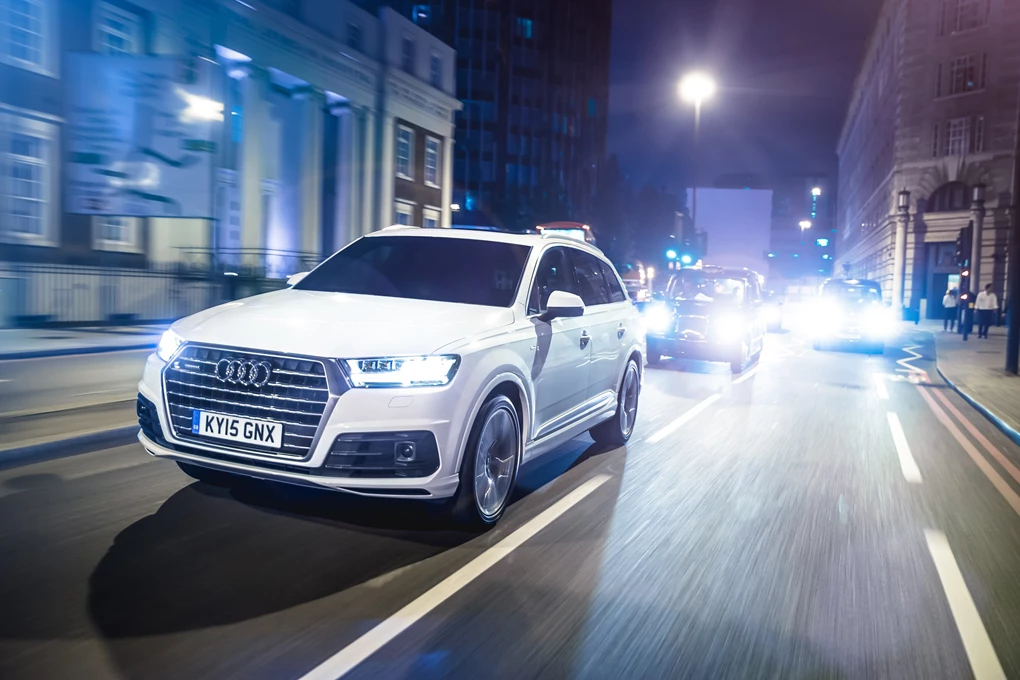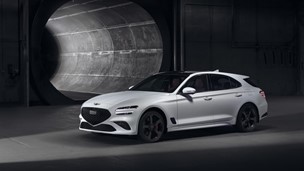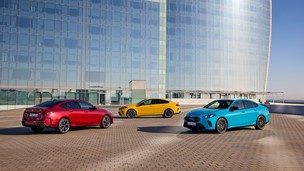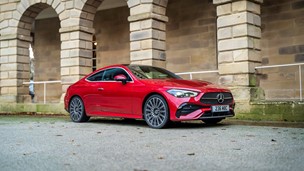The Audi Q7 is the premium manufacturer’s flagship SUV, but despite feeling like part of the automotive furniture, this all-new model is only the second-generation. So what’s it like? Well, it might look similar – albeit with sharper lines – but it’s much lighter, thanks to studious attention to weight saving and the use of more aluminium.
By making it as much as 325kg lighter than before, performance, economy and handling are all significantly improved. The Q7 also gets loads of technology, from standard sat-nav to optional systems which take over the controls in traffic jams.
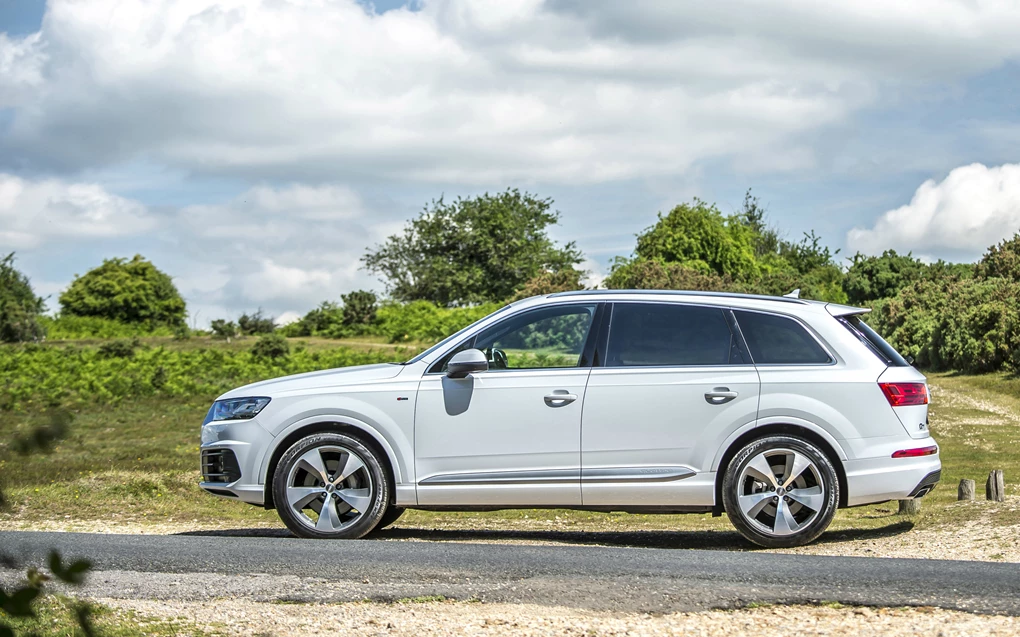
Performance
To begin with, there’s just one engine, a 3.0-litre TDI with 268bhp and a staggering 600Nm of torque. Given the lack of choice, it’s a good job this is a great engine, remaining quiet and unflustered under acceleration and serving up a sense of unerring power. It can get the newly fit Q7 from rest to 62mph in just 6.5 seconds, with smooth shifts from its standard eight-speed automatic gearbox and quattro four-wheel drive. A 215bhp version of the same engine will arrive later, with slightly improved running costs and a lower price tag.
With standard suspension the Q7 can tow a braked trailer weighing up to 2,800kg, however this increases to the maximum 3,500kg if adaptive air suspension is fitted.
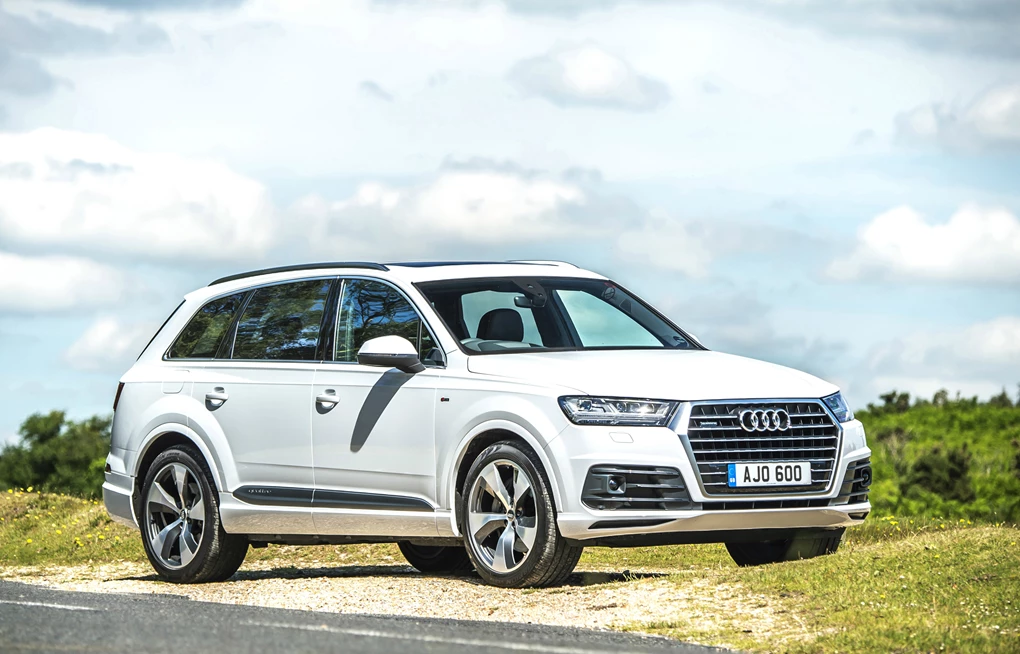
Ride and Handling
For the ultimate Q7 experience, you’ll need adaptive air suspension, costing £2,000, which alters the ride height and stiffness of the suspension as you change driving modes.
The Q7 might be simply massive – it’s over five metres from tip to tail – but you wouldn’t know it from behind the wheel. The steering is a bit too light in Audi’s Comfort setting, but switch to Dynamic or Auto and it weights up nicely at speed, and the whole driving experience fills you with confidence. It might not be sports car-worthy (you’d need a Porsche Cayenne for that), but it does get down a road remarkably well for an SUV of its size. Just remember to brake early. Sure, it is a lot lighter than before, but with such unflustered handling, you can sometimes forget you still have two tonnes of luxury SUV to stop at every junction. With standard suspension the Q7 is comfortable, although the 20-inch wheels can get unsettled by sharp bumps and potholes. For the ultimate Q7 experience you’ll need adaptive air suspension, costing £2,000, which alters the ride height and stiffness of the suspension as you change driving modes, giving a more pronounced distinction between Comfort and Dynamic. Another important option to consider is all-wheel steering, which can turn the rear wheels by up to 5 degrees. At low speeds they turn in the opposite direction to the front wheels, reducing the Q7’s turning circle by a metre to 11.4 metres, the same as an Audi A4 saloon. At high speeds they turn in the same direction as the front wheels, improving stability.
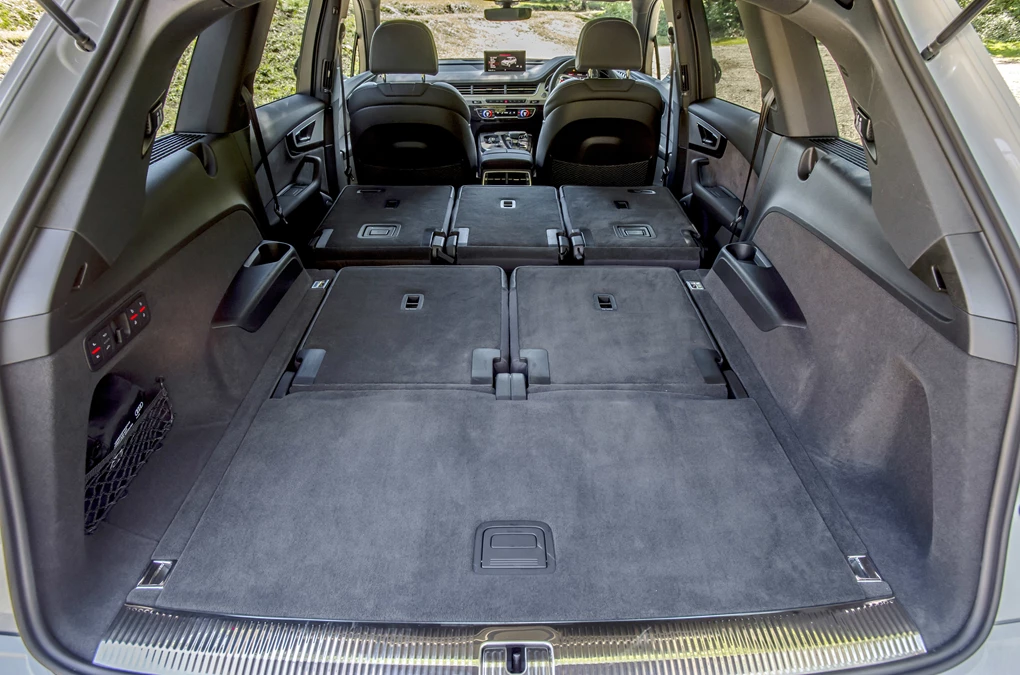
Interior and Equipment
The Q7 debuts Audi’s Traffic jam assist, a system which allows the car to help with braking, acceleration and steering at speeds below 37mph, taking some of the stress out of congestion.
The interior is said to represent ‘New Audi’, but in reality it’s an evolution of the quality of materials and design we’ve come to expect as pretty much the best in the business. There are now swathes of aluminium across the dashboard and a sportier steering wheel, along with the option of Audi’s Virtual Cockpit, a 12.3-inch digital replacement for the instrument cluster, which debuted in the TT Coupe. Standard kit includes climate control, seven seats, an 8.3-inch infotainment system, Audi Parking System Plus, Bluetooth, cruise control, a powered tailgate and much, much more. There are optional packs, including the £1,950 Technology Pack, which includes the Virtual Cockpit, Head-up Display, Audi Phone Box, High beam assist and a three-year subscription to Audi Connect. A Dynamic Pack includes air suspension, adaptive cruise control, traffic jam assist, predictive efficiency assist, collision mitigation and traffic sign recognition from £2,655. Choose the S line model and 20-inch wheels and an S line body kit ensure the Q7 gets even more road presence. There’s also LED headlights, a three-spoke steering wheel, leather and alcantara interior upholstery and sports seats, along with tinted rear windows, four-zone climate control and sweeping rear indicators.
Cost
Residual values are amongst the best-in-class too, with trade experts CAP predicting 45 per cent retained value.
The effects of making the Q7 lighter and more advanced boil down to figures of 47.9mpg and 153g/km of CO2 tailpipe emissions, placing it almost on a par with the Volvo XC90 D5 R-Design (48.7mpg and 152g/km) and slightly ahead of the BMW X5 xDrive 30d M Sport (47.1mpg and 158g/km). Compared with the older model, it’s a 9.7mpg and 42g/km improvement, resulting in a drop in annual road tax from £265 to £180. Residual values are amongst the best-in-class too, with trade experts CAP predicting 45 per cent retained value after 36 months/60,000 miles, ahead of 43 per cent for the XC90 and X5.
Our Verdict
The Audi Q7 has always had a good reputation for quality, but it was starting to look dated against rivals. The all-new version represents a big step forwards in technology, efficiency and safety. It’s also highly practical, with seven seats as standard and go-anywhere potential. And let’s not forget about its road-domineering style – plus the prestige of having the rings of the Audi badge plastered on the front-end.
